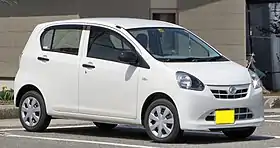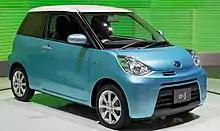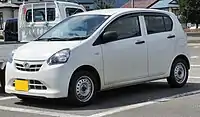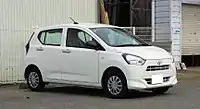Daihatsu Mira e:S
The Daihatsu Mira e:S (Japanese: ダイハツ・ミライース, Daihatsu Mira Īsu) is a kei car manufactured by the Japanese automaker Daihatsu as the successor to the original Mira. It was previewed by the e:S concept car at the 2009 Tokyo Motor Show. The car was introduced to the Japanese market in September 2011. It was also sold by Toyota as the Toyota Pixis Epoch (Japanese: トヨタ・ピクシスエポック, Toyota Pikushisu Epokku), which was released on 10 May 2012 and by Subaru as the Subaru Pleo Plus (Japanese: スバル・プレオプラス, Subaru Pureo Purasu), which was released on 21 December 2012.
| Daihatsu Mira e:S | |
|---|---|
 Daihatsu Mira e:S Lf 4WD (LA310S) | |
| Overview | |
| Manufacturer | Daihatsu |
| Also called |
|
| Production | September 2011 – present |
| Assembly | Japan: Nakatsu, Ōita (Daihatsu Motor Kyushu)[1][2][3] |
| Body and chassis | |
| Class | Kei car |
| Body style | 5-door hatchback |
| Layout | |
| Chronology | |
| Predecessor |
|
The "e:S" stands for "Eco and Smart".
Overview

In response to the recent rise in environmental awareness and low priced cars, the Mira e:S has been developed with the concept of "the third eco car". It is the mass production version of the e:S concept car.
The existing technology owned by Daihatsu was reviewed, and by using the "e:S technology", the fuel efficiency has been improved by 40% compared to the conventional engine by reducing the weight of the vehicle, improving the transmission, improving the engine, etc.[4]
The engine improves combustion efficiency by improving the compression ratio and the injector spray atomization, etc., and by using the "i-EGR system", the mechanical loss is reduced to the utmost by making improvements over details. Furthermore, by adopting cooperative control by the electronic throttle, the most efficient state is maintained according to the driving situation. The CVT also reduces emissions by increasing the efficiency of the oil pump and improves the power transmission efficiency by lowering the CVT control pressure. As a result, the engine load was also reduced by optimizing the transmission gear ratio (high gearing).[5]
The body is made streamlined while maintaining the safety and a comfortable ride. The weight reduction has been made to the interior parts such as thinning of resin parts such as instrument panels, seat frame and CVT for idling stop. The air resistance has been suppressed by improving the shape of the front corners and reducing the flow velocity under the floor, and the rolling resistance was also reduced by improving the aforementioned weight reduction, bearings and brakes.[5]
The idling stop mechanism "eco IDLE" that is installed in some grades of the Move and Move Conte is also equipped as standard for all vehicles, but Mira e:S's eco IDLE is the world's first for CVT vehicles with petrol engines. By applying the brakes and automatically stopping the engine when the speed is 7 km/h (4.3 mph) or less, the fuel consumption is improved by increasing the idling stop time. In addition, by reducing the number of dedicated parts, it has achieved weight reduction and "compactification".[5]
With these technologies, JC08 mode fuel consumption achieved a fuel consumption of 30 km/L (85 mpg‑imp; 71 mpg‑US) for front-wheel drive models and 27 km/L (76 mpg‑imp; 64 mpg‑US) for four-wheel drive models.[5]
The cost of the vehicle was reduced by reducing the number of parts and reducing the weight of the vehicle by approximately 60 kg (132 lb) by reviewing the component layout, shape, material selection and specifications.[5]
The production of the car is conducted at Daihatsu Motor Kyushu in Nakatsu, Ōita.
First generation (LA300; 2011)
| First generation (LA300) | |
|---|---|
 Daihatsu Mira e:S Xf SA 4WD (LA310S) | |
| Overview | |
| Production | September 2011 – May 2017 |
| Body and chassis | |
| Related | Daihatsu Move (LA100) |
| Powertrain | |
| Engine | 658 cc KF-VE I3 (petrol) |
| Power output | 36–38 kW (48–51 hp; 49–52 PS) |
| Transmission | CVT |
| Dimensions | |
| Wheelbase | 2,455 mm (96.7 in) |
| Length | 3,395 mm (133.7 in) |
| Width | 1,475 mm (58.1 in) |
| Height | 1,500 mm (59.1 in) |
| Kerb weight |
|
The first-generation Mira e:S was released on 20 September 2011. At the time of its introduction, it won the Good Design Award on 3 October 2011.
Both the Mira e:S, Pixis Epoch and Pleo Plus received a facelift update on 19 August 2013.
 Daihatsu Mira e:S D (LA300S)
Daihatsu Mira e:S D (LA300S) Daihatsu Mira e:S Xf Limited SA 4WD (LA310S)
Daihatsu Mira e:S Xf Limited SA 4WD (LA310S) Toyota Pixis Epoch (LA300A)
Toyota Pixis Epoch (LA300A) Subaru Pleo Plus G SA (LA300F)
Subaru Pleo Plus G SA (LA300F) Interior
Interior
Second generation (LA350; 2017)
| Second generation (LA350) | |
|---|---|
_front.jpg.webp) Daihatsu Mira e:S X SA III (LA350S) | |
| Overview | |
| Production | May 2017 – present |
| Body and chassis | |
| Related | Daihatsu Mira Tocot |
| Powertrain | |
| Engine | 658 cc KF-VE I3 (petrol) |
| Power output | 36 kW (48 hp; 49 PS) |
| Transmission | CVT |
| Dimensions | |
| Wheelbase | 2,455 mm (96.7 in) |
| Length | 3,395 mm (133.7 in) |
| Width | 1,475 mm (58.1 in) |
| Height |
|
| Kerb weight |
|
The second-generation Mira e:S was released on 9 May 2017, alongside the second-generation Pixis Epoch and Pleo Plus.
.jpg.webp) Daihatsu Mira e:S X SA III (LA350S)
Daihatsu Mira e:S X SA III (LA350S)_rear.jpg.webp) Daihatsu Mira e:S X SA III (LA350S)
Daihatsu Mira e:S X SA III (LA350S) Toyota Pixis Epoch L 4WD (LA360A)
Toyota Pixis Epoch L 4WD (LA360A)_front.jpg.webp) Subaru Pleo Plus F (LA350F)
Subaru Pleo Plus F (LA350F)_interior.jpg.webp) Interior
Interior
References
- https://www.daihatsu.com/company/facilities/
- https://www.daihatsu.com/news/2020/20200518-2.pdf
- https://paultan.org/2013/12/01/perodua-global-manufacturing-mirrors-daihatsu-kyushu-plant/
- "ダイハツ、30km/Lのガソリン車技術「e:Sテクノロジー」発表". Car Watch. 19 July 2011.
- "Archived copy". Archived from the original on 29 October 2011. Retrieved 10 June 2019.CS1 maint: archived copy as title (link)
External links
| Wikimedia Commons has media related to |
- Official website (Mira e:S)
- Official website (Pixis Epoch)
- Official website (Pleo Plus)